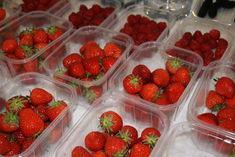

A radical new soft-fruit campaign to encourage consumers to eat British, Spanish and Chilean berries when they are at their best was unveiled last week as the replacement for the British Summer Fruits (BSF) and Winter Berries initiatives.
The Seasonal Berries campaign will form an integrated year-round platform with endorsement from an as yet unnamed food expert, in the latest move to secure the future growth of the category.
The UK industry will work with Spanish and Chilean partners, including Foods from Spain, Freshuelva and Asoex, to promote the concept of seasonality, without diluting the “emotional” relationship UK consumers have with soft fruit.
The first phase of the project will spotlight the British soft-fruit season, launched officially at a reception in London last Thursday. The next stages will focus on British raspberries, followed in turn by autumn blackberries, Chilean blueberries and Spanish berries.
A new website - www.seasonalberries.co.uk - launches on June 2.
The BSF campaign, which started in 2003, has grown the UK market for berries by 85.8 per cent over the last five years. The start of the Seasonal Berries initiative will see target media receive wicker baskets of fruit to mark the start of the UK strawberry season, followed by a number of promotional activities including a radio tour.
Kate Shanahan, who manages the BSF account at PR agency Sputnik Communications, said: “We know we can’t just sit back and expect to enjoy the same level of success as we have done because the market is getting increasingly competitive and consumers are spoilt for choice. We have to deliver an integrated 12-month campaign.
“We carried out consumer research to find out the drivers and barriers to purchasing berries in key groups, such as young families. The importance of seasonality cannot be underestimated, because this highlights how special berries are.
“Consumers respond very positively to berries because they react to them in a very emotional way, associating them with summer and childhood nostalgia. These feelings mean that soft fruit is often an impulse buy and that the emotions involved can override other considerations, such as price.
“Our research found that taste is more important than health benefits, but that health can provide a rational back-up for purchases. Both taste and health were found to be more important than price.”
Laurence Olins, chairman of Seasonal Berries, said the campaign would continue to build on one of the most “modern” and “sophisticated” sectors in the UK fresh produce industry. Speaking at the Canary Wharf reception to kick off the first phase of the project, he said: “It is essential that we as an industry respond to our consumers if we are to enjoy continued success. This is why we have launched the Seasonal Berries campaign, to promote soft fruit throughout the year to get consumers to eat fruit when it is at its best. Seasonality is a powerful strategy, and we hope it will benefit our whole industry.
“We are going to be talking a lot more about provenance so that consumers understand where their berries come from.”
But KGG chairman Marion Regan raised some concerns about the new campaign from the floor, claiming that while a few years ago it was a “revelation” when the berry sector moved away from its traditional image to attract new consumer groups, she fears that the sector will be “confined to a wicker basket”, referring to the packs sent out to the media.
Andrew Sharp, business development director at Mack Multiples, countered that the campaign was in line with how the UK market works. “The campaign reflects what multiples want, which is to sell more berries no matter where they come from,” he said, speaking from the floor. But he highlighted Gordon Ramsay’s recent calls for fines for restaurants using out-of-season produce, as well as consumer concerns about food miles and the common examples of strawberries at Christmas as two ‘issues’ to follow.



